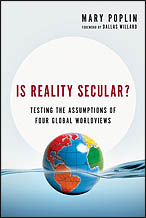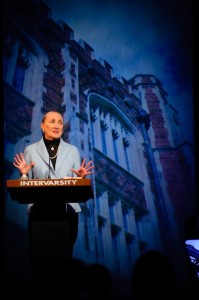
Welcome to the third post in a series in which we explore with Mary Poplin her 2014 publication Is Reality Secular? Testing the Assumptions of Four Global Worldviews? (InterVarsity Press). In earlier posts Mary provided:
- perspective on why she wrote Is Reality Secular?
- a brief snapshot of the four global worldviews she writes about in Is Reality Secular?
In this piece Mary Poplin responds to my question, “What do you desire to be the top takeaways for readers of Is Reality Secular?” In future posts Mary will offer particular illustrations of engaging in and “toolkits” to enter/sustain dialogue with those who embrace (even advocate) competing worldviews.
Mary: First, I want to plant into everyone’s mind the fact (or for secularists, at least the suspicion) that reality is not secular. It is not adequate then to work only within the secular mindset. Christian faculty must engage this; what is true and what is false in my field – because all dominant theory and research have been secularized for half a century and more. I hope Christians will ask others to consider the same question; I find very few people realize that secular thought dominates our culture and fewer have asked themselves if this is really true.
Christianity offers access to a higher rationality. The Christian worldview includes the truths inherent in other worldviews; they are never complete opposites. Evil cannot create anything new; it can only distort. For example, Christians believe in the scientific method, spiritual reality, free will and the desire to be good. However, Christianity rejects the false principles in these other worldviews and, most importantly, it contains principles that transcend these other worldviews.
Christianity is the only perfect plan for global unity. Christianity is the only religion into which we cannot be born; it is a choice that any person in any culture can make. Christ is the head of a single body, which is incredibly diverse, and we are like individual cells in his one body. Where Christianity flourishes, individuals and cultures thrive. Christ is equally challenging and enhancing to every human culture – the West no more or less than China or Africa or India.
Judeo-Christianity is what made the West great. Atheist German philosopher, Jurgen Habermas, who says we have now entered the post-secular age, writes that the Western ideals that others value come directly from the Judaic ethic of justice and the Christian ethic of love and everything else is “postmodern chatter.” Italian atheist philosopher and former senator Marcelo Pera in his book Why We Should Call Ourselves Christian writes that there are ways to assess which worldview is better than another. He suggests the Judeo-Christian worldview has proved superior and thus we should all either believe in this God or act like we do.
Secularism is reducing our minds, souls and cultures to the lowest common denominator. The pervasive power of secularism influences how much we have unconsciously absorbed. Secular strongholds exist over our academy, our media, our government, our arts, our businesses, and even sometimes our families and churches. It is one reason we are losing our freedom of religion because even well intended people do not understand that unique knowledge exists in Christianity.
Judeo-Christian principles are simply the best explanation of reality, of what is true. After a difficult but liberating twenty-one year struggle where God begin to transform my mind by knowing Christ where I could step back and understand and explore the evidence for other worldviews, I can confidently say there is simply no winning argument against Judeo-Christian thought. There can be valid arguments against particular churches or Christians but the Judeo-Christian worldview remains the only full and true description of reality; its principles are simply the most life-giving.

There are consequences to belief in any worldview. The Christian worldview is by far the one that leads to the most human and natural flourishing. It gives us science without scientism, humanism without moral relativity, and spirituality with a purpose for here and now. Other worldviews often have dire consequences – treating people as though they are material rather than precious in God’s sight (material-naturalism), allowing the gradual slide of moral and ethical choices in individuals and cultures and making choices based on sheer power (secular humanism), and encouraging a state of ennui in which nothing matters but one’s own actions (pantheism).
Tom: Thank-you Mary! Through this series I have found myself becoming not only better equipped, but also looking for more opportunities to engage in dialogue across worldviews in the complex context of higher education. I pray that our readers will find themselves offering similar testimony. I look forward to our continuing conversation. May God richly bless your labors as the new academic year unfolds. To God be the glory!
Tom enjoys daily conversations regarding living out the Biblical Story with his wife Theresa and their four girls, around the block, at Elizabethtown Brethren in Christ Church (where he teaches adult electives and co-leads a small group), among healthcare professionals as the Northeast Regional Director for the Christian Medical & Dental Associations (CMDA), and in higher ed as a volunteer with the Emerging Scholars Network (ESN). For a number of years, the Christian Medical Society / CMDA at Penn State College of Medicine was the hub of his ministry with CMDA. Note: Tom served with InterVarsity Christian Fellowship / USA for 20+ years, including 6+ years as the Associate Director of ESN. He has written for the ESN blog from its launch in August 2008. He has studied Biology (B.S.), Higher Education (M.A.), Spiritual Direction (Certificate), Spiritual Formation (M.A.R.), Ministry to Emerging Generations (D.Min.). To God be the glory!

Leave a Reply